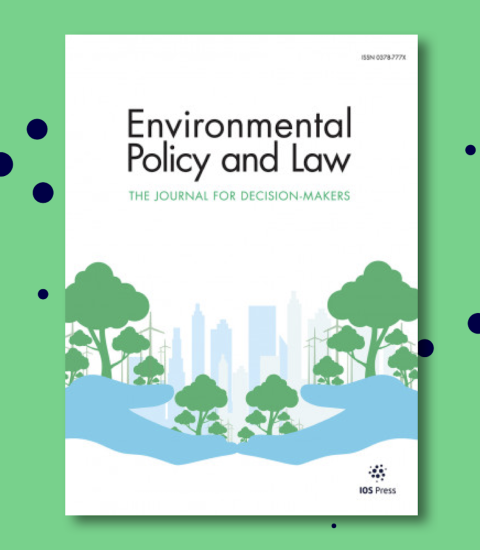
Amsterdam, April 23, 2024 – Because 80% of climate migrants are women and girls, a new international legal framework is needed to protect human rights, incorporating gender-sensitive and responsive measures in policies and legislations. An insightful article in a special issue of the journal Environmental Policy and Law (EPL) published by IOS Press, details the complexities of the perpetuation of inequalities, existing vulnerabilities, and lack of protection impacting migrant women and girls.
"Climate change is evidence of a clear weakening of human rights, especially in areas that are already experiencing greater exposure to the effects of climate change and lower resilience due to existing socioeconomic contexts,” says author and environmental lawyer Susana Borràs-Pentinat, Associate Professor in International Law, Universitat Rovira i Virgili, Spain. "Multidimensional inequality and insecurity are present throughout the migration process and are particularly critical in the case of migrant women and girls, who account for 80% of all climate displacement.”
The United Nations estimates that, by the year 2050, the effects of climate change will result in the displacement of 150 million or more people due to extreme weather and slow-onset events such as sea-level rise and desertification. Also, the Intergovernmental Panel on Climate Change predicted that, in the coming years, migration would become a response to climate change, with millions of people displaced by coastal flooding, coastal erosion, desertification processes, and losses in agricultural production.
"People who leave their territories of origin do so in very complex contexts, in search of safety and well-being, exercising their human right to migrate with dignity to other safe territories, whether within or outside their countries," Dr. Borràs-Pentinat explains.
In the editorial of the special issue on International Environmental Law (IEL): Perspectives of Women Scholars, Editor-in-Chief of EPL, Bharat H. Desai, PhD, Jawaharlal Nehru University, Centre for International Legal Studies, writes, "SDG 5 aims to ‘achieve gender equality and empower all women and girls.’ In the third decade of the 21st century, humankind is still grappling with vital issues concerning gender-based inequality, discrimination and violence faced by women and girls who constitute almost half of the world’s eight billion population. Notwithstanding the cherished goals prescribed in the international human rights and other regulatory instruments to bring about changes, the mental attitudes and harsh global realities persist on the ground for women and girls."
According to Dr. Borràs-Pentinat, "The impacts of climate change cause women, especially those living in more impoverished communities, to face a heavy psychological burden. Power structures and relations lead to increased vulnerability to extreme weather events and climate change-related disasters. This structural vulnerability increases when women and girls become climate migrants.”

In recent years, there have been some developments in different sectors of international regulation to recognize climate change as a cause of migration, including from a gender-sensitive perspective. "These developments, while positive, have demonstrated the lack of an integrative vision between the international legal regime on migration and refuge, climate change and human rights," adds Dr. Borràs-Pentinat.
She concludes, "There is a need for a rethinking of existing legal frameworks to respond to the reality of climate migration from a gender-sensitive perspective that effectively protects human rights. Heteropatriarchal power dynamics—which exclude women from decision-making processes—have prevented the proper integration of a gender perspective into policies and legal standards for environmental protection. It is essential to reverse the victim or vulnerable role assigned to women and instead recognize their role as leaders and agents of change in climate change and migration contexts. Innovative legal-policy responses are required that adapt existing refugee and migration-related legal frameworks to the humanitarian challenges generated by climate change."
# # #
NOTES FOR EDITORS
The article is “Climate Migration: A Gendered Perspective,” by Susana Borràs-Pentinat (https://doi.org/10.3233/EPL-239008). The article is openly available at https://content.iospress.com/articles/environmental-policy-and-law/epl239008.
The editorial is "International Environmental Law (IEL): Perspectives of Women Scholars," by Dr. Bharat H. Desai (https://doi.org/10.3233/EPL-239019). The article is openly available at https://content.iospress.com/articles/environmental-policy-and-law/epl239019.
Both articles appear in Volume 53, Issue 5/6 of Environmental Policy and Law, published by IOS Press. The PDFs of the articles and further information are also available from Diana Murray, IOS Press, at +1 718-640-5678 or d.murray@iospress.com. Journalists wishing to interview Susana Borràs-Pentinat, may contact her at susana.borras@urv.cat. Bharat H. Desai may be reached for comment at desai@jnu.ac.in.
CONTACT
Diana Murray
IOS Press
+1 718-640-5678
d.murray@iospress.com
About the journal Environmental Policy and Law (EPL)
Environmental Policy and Law (EPL) is an international journal that publishes cutting-edge scholarly works that have global significance. By bridging both academic and professional domains in the environmental field, EPL serves the needs of professionals, practitioners, researchers, students, and policymakers. The journal invites analyses that are at the forefront of academic debate and are of practical significance and policy relevance. EPL publishes policy commentaries, short reports, and a range of peer-reviewed content including research and review articles. https://environmentalpolicyandlaw.com
About IOS Press
IOS Press, now part of Sage, is an international scientific, technical, medical (STM) publishing house established in 1987 in Amsterdam. We produce around 90 journals and 70 books annually in a broad range of subject categories, primarily specializing in health and life sciences (including neurosciences, medical informatics, cancer research, and rehabilitation) and computer sciences (including artificial intelligence, data science, and semantic web). In addition, we offer specialized services that support scientific advancement. www.iospress.com
About Sage
Sage is a global academic publisher of books, journals, and library resources with a growing range of technologies to enable discovery, access, and engagement. Believing that research and education are critical in shaping society, 24-year-old Sara Miller McCune founded Sage in 1965. Today, we are controlled by a group of trustees charged with maintaining our independence and mission indefinitely. https://group.sagepub.com
